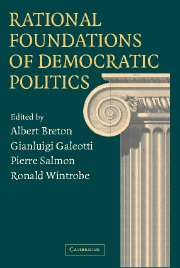Book contents
- Frontmatter
- Contents
- List of Contributors
- 1 Introduction
- PART ONE SOME PROBLEMS WITH DEMOCRATIC INSTITUTIONS AND TRENDS IN THEIR EVOLUTION
- 2 Demobilized and Demoralized: Negative Ads and Loosening Bonds
- 3 Turning “Citizens” into “Consumers”: Economic Growth and the Level of Public Discourse
- 4 Economic and Cultural Prerequisites for Democracy
- 5 Civil Society and the Contemporary Social Order
- PART TWO MORALS IN POLITICS
- PART THREE SOCIAL CAPITAL
- PART FOUR THE ROLE OF CONSTITUTIONS
- Index
- References
2 - Demobilized and Demoralized: Negative Ads and Loosening Bonds
Published online by Cambridge University Press: 28 July 2009
- Frontmatter
- Contents
- List of Contributors
- 1 Introduction
- PART ONE SOME PROBLEMS WITH DEMOCRATIC INSTITUTIONS AND TRENDS IN THEIR EVOLUTION
- 2 Demobilized and Demoralized: Negative Ads and Loosening Bonds
- 3 Turning “Citizens” into “Consumers”: Economic Growth and the Level of Public Discourse
- 4 Economic and Cultural Prerequisites for Democracy
- 5 Civil Society and the Contemporary Social Order
- PART TWO MORALS IN POLITICS
- PART THREE SOCIAL CAPITAL
- PART FOUR THE ROLE OF CONSTITUTIONS
- Index
- References
Summary
I don't like this backbiting – this putting someone down to build yourself up.
Betty Norden, administrative assistant, Washington, North Carolina, quoted in Raleigh News and Observer, April 30, 1996.NEGATIVE ADVERTISING AND THE QUALITY OF ELECTIONS
Ms. Norden raises two important theoretical questions. I have fleshed out the questions, and given what I believe to be the answers:
Q: Is it possible for political candidates to use negative advertising to “put someone down to build yourself up”? This is clearly the popular perception, but is it consistent with an equilibrium model that allows the best response to advertising messages?
A: As is often the case, the answer is, “It depends.” If you mean, “Are candidates usually able to win more votes if they ‘go negative,” the answer isYES. If you mean “Are all candidates able to increase their net vote percentages by negative ads, in equilibrium,” the answer is clearlyNO.
Q: Is Ms. Norden's “dislike” of mudslinging simply a matter of taste, or is there something deeper at work?
A: There is something much deeper at work. Negative ads are individually rational, in the sense that they “work” for the candidates. But the utility citizens derive from living in such a political system is sharply reduced.
In this chapter, I review briefly some of the results on negative campaigning, and then consider the effects of attack tactics on the citizens and the electoral system.
- Type
- Chapter
- Information
- Rational Foundations of Democratic Politics , pp. 15 - 29Publisher: Cambridge University PressPrint publication year: 2003



